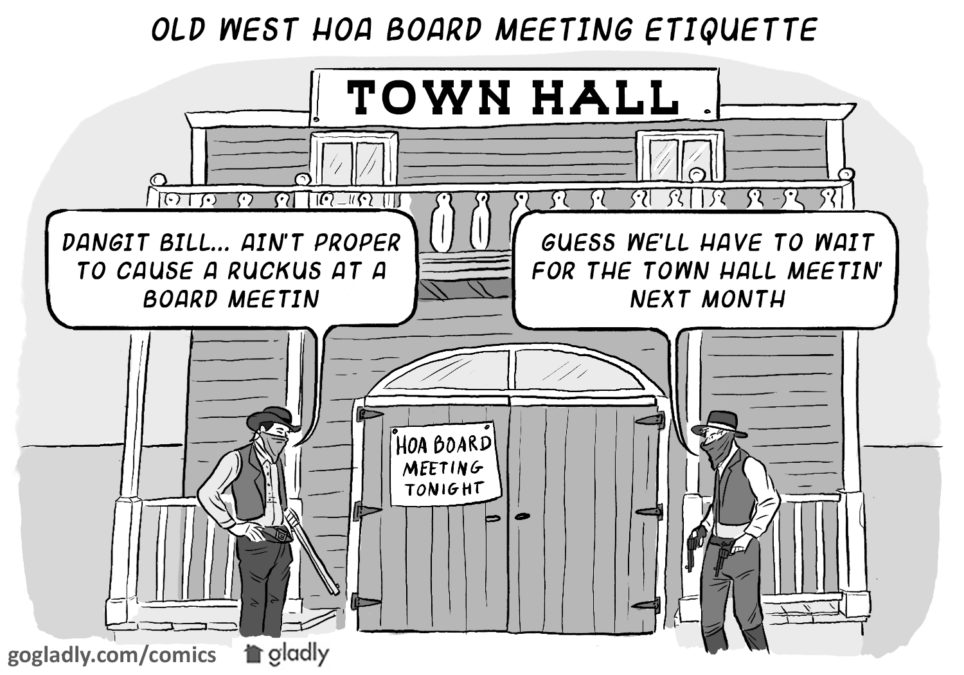I was recently asked to explain the differences of a Board Meeting and a Town Hall Meeting. For many homeowners and even board members, the difference between these two meetings is not entirely clear.
Town Hall Meeting
Town Hall meetings are generally held as an opportunity for the Board, Homeowners, and sometimes industry experts (roofers, construction consultants, engineers, lawyers) to discuss specific topics, in a more casual and conversational manner (as compared to a formal Board Meeting). Town Hall meetings are not an opportunity to vote on specific topics.
-
- Q: Does a Town Hall meeting need to be Noticed?
- A: Yes, a Town Hall meeting must be Noticed if a Quorum of the Board is present. Logic assumes that the board members will be present because they want to engage in dialogue with the membership.
-
- Q: What is the format of a Town Hall Meeting?
- A: The President should chair the meeting but in a significantly less formal manner.
-
- Q: Does a Town Hall meeting require meeting minutes?
- A: If a quorum of the Board is present, yes, you must take minutes, but the minutes will be minimal because there will be NO board action (votes) at a Town Hall meeting because it is NOT a Board Meeting. The minutes will just state that a Town Hall was held, on <insert date> and maybe include a list of general topics discussed. Sometimes the Town Hall has a specific topic (water submetering), or sometimes it is just an opportunity for the homeowners to come to the Board with their complaints, comments, and compliments.
Town Hall Meeting Summary: During multiple Town Hall meetings for a proposed CC&R amendment to permit submetering of the water utilities, I took notes based on the information provided by the speaker/presenters and prepared an informational letter to the homeowners. Management and board reviewed the letter, and once approved, the letter was distributed to the homeowners. This provides information, transparency, and communication; the things most homeowners want from their Board of Directors.
Board Meeting
A meeting of the elected representatives of the homeowner association, for the purpose of conducting corporate business.
In states like California, the Board must provide an opportunity for homeowners to speak to the Board concerning agenda and non-agenda items. In other words, the “gripe session”.
The Board may (and probably should) limit time per speaker, and limit the overall time allotted for homeowner forum. If there is a hot topic, consider allotting more time for homeowner forum, or schedule a Town Hall meeting.
In California, the Board cannot take actions on non-agenda items brought up by the homeowners, except to direct management to place onto the next month’s agenda. There are minimal exceptions, for example, Board may direct management to follow up with the homeowner and report back to the President if the item appears to be of an urgent nature. NOTE: Even if you do not live in a state that restricts action on non-agenda items, there are reasons to not engage in the back-and-forth dialogue with the homeowners: #1 The Board does not have all the information they need to evaluate and respond to the homeowner concerns. Uninformed decisions are bad decisions! #2 You end up in a non-productive cycle of back and forth arguments that extend the meeting, and usually to little resolve. Insist the homeowner send their concerns to management, in writing, for inclusion in the next board packet. This gives management an opportunity to prepare and respond appropriately, and reach an informed decision.
Most governing documents include language pertaining to the conduct of meetings in a recognized form of parliamentary procedure. In short, this means that the Chair must know (or learn) how to control the meeting.
RULE #1 – All members need to be recognized by the Chair before speaking. Remember when we were children and our parents told us not to interrupt? Remember when good manners dictated that we not interrupt people while they were speaking? That is how your meetings should be conducted! Be POLITE. It actually feels good to be polite, once you get used to it!
TIP: Create a timed agenda. (this means you put times next to each agenda item, thereby limiting the time for debate). If debate is not concluded when the time arrives, call for the vote, or vote to postpone the item until the next month’s agenda. It is time to move to the next agenda item! As volunteers, you should not be subjected to long drawn out meetings! After all, “Great Meetings Don’t Just Happen; They Are Planned”.
- Town Hall vs Board Meeting, and Why it Matters - January 22, 2018
- Heating Up and Cooling Down - June 29, 2016
- Meeting Minutes Matter™ The Short Term Rental - May 25, 2016



 Help
Help
Well written. Thank you. Only thing I’d add is that town halls often get more members involved than board meetings. This gives the opportunity to welcome other voices and promote the “we” aspects of the association. Plus those new to business meeting members might well be future board members.
Good point, Henry. Thanks!
Well written and great info. One of our larger clients has Board meetings every other Friday at 7:00 a.m. and no one typically shows up other than the Board, so the meetings are quick and effective. They hold town hall meetings regularly to disseminate information and get feedback prior to making decisions. The town hall meetings are in the evenings when more people will attend. Both are open to owners, but the scheduling of the meetings is genius in my opinion.
Good information. Reinforces my thoughts regarding HOA board participation.